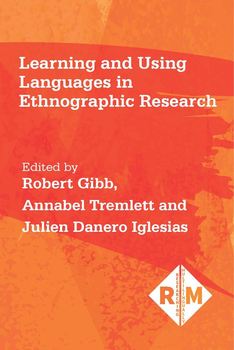In Learning and Using Languages in Ethnographic Research, editors Robert Gibb, Annabel Tremlett and Julien Danero Iglesias bring together contributors to explore issues that researchers may encounter when learning and using another language in ethnographic fieldwork. Providing readers with a set of accessible accounts of language learning and use, the collection aims to demystify language learning in the field and encourage wider debate about how researchers employ multilingualism in their work. This engaging yet practical volume will prove useful to scholars and students who may feel uncertain about how to broach language learning issues in their research, writes Katherine Williams.
Learning and Using Languages in Ethnographic Research. Robert Gibb, Annabel Tremlett and Julien Danero Iglesias (eds). Multilingual Matters. 2019.
 In Learning and Using Languages in Ethnographic Research, contributors argue that much can be learned from paying close attention to the multilingual aspects of ethnographic work. As editors Robert Gibb, Annabel Tremlett and Julien Danero Iglesias point out, using languages in the field can be very challenging. The aim of the volume is to help researchers make informed choices when it comes to language learning and fieldwork, as well as encourage a broader debate about the epistemological and methodological issues that may arise during this time.
In Learning and Using Languages in Ethnographic Research, contributors argue that much can be learned from paying close attention to the multilingual aspects of ethnographic work. As editors Robert Gibb, Annabel Tremlett and Julien Danero Iglesias point out, using languages in the field can be very challenging. The aim of the volume is to help researchers make informed choices when it comes to language learning and fieldwork, as well as encourage a broader debate about the epistemological and methodological issues that may arise during this time.
With definitions of ethnography varying between academic disciplines, it is broadly defined in this volume as the process of understanding the everyday lives and activities of other people through direct observation and participation in these activities for a significant period of time. Three important points are outlined in the introduction: firstly, the process of language learning and the subsequent building of interpersonal relations with others is a fundamental part of ethnographic research. Secondly, the chapters emphasise that research is embedded in wider processes of power, hierarchy and inequality, and can be challenging as a result. Thirdly, the volume draws attention to common issues experienced by researchers in the field, whether anxiety, lack of confidence in language ability, loneliness or vulnerability – topics that are not often broached in the corresponding literature. As the first English-language collection of its type, the volume therefore aims to ‘break the silence’ surrounding the key issues that researchers may face while learning or using languages in the field.
The first section of the book comprises seven chapters that focus on how researchers learn, ‘unlearn’ or relearn languages. The detailed, personal accounts from both PhD students and senior academics discuss how researchers have approached learning one or more new languages at different stages in their academic career. Contributors in the first section reflect upon learning languages that run the gamut from Tamil and Swahili to Mandarin Chinese, Spanish and French.
The second section of the book moves the focus from learning to using languages and the concordant epistemological, methodological and practical issues that may arise when conducting ethnographic fieldwork. Some of the topics broached in this section include the questioning of socio-cultural assumptions when conducting research in contested sites, the desire to speak the target language ‘like a native’ and the feelings of anxiety and embarrassment one must grapple with while in the field. The final two chapters focus on the academic and institutional barriers that one may encounter when undertaking multilingual ethnographic fieldwork.

There is a distinct lack of detailed accounts of how researchers learn or relearn languages for their fieldwork, as Gibb points out in Chapter Five in his discussion of the importance of documenting and reflecting upon one’s language learning journey. In doing so, researchers can help to ‘break the silence’ that surrounds this issue. However, this is not a straightforward task. The author, who has employed French and Bulgarian in his own research projects, suggests that the concept of ‘language’ itself needs to be reappraised. Instead of a singular focus on linguistic competency, the concept of ‘sociolinguistic competence’ may prove more helpful in developing a better understanding of the context within which language is embedded, as well as the processes and practices that guide our individual language learning experiences. Indeed, while shared language skills may better facilitate communication between individuals, it does not necessarily mean that researchers will be better able to relate to participants in terms of their lived experiences or socio-cultural practices.
In hindsight, Gibb became aware that he had not paid due attention to matters of language learning in the write-up of his thesis; only a small amount of material relating to this process made it to the final draft. This gives the impression that language learning is a seamless and uncritical process. One may have the ‘naïve confidence’ that one will pick up the language along the way, but learning languages in the field can be time-consuming, expensive and exhausting; language learning often begins long before a researcher enters the field and it can be rife with difficulties. In subsequent research projects in which Bulgarian was used, Gibb attempted to better document and analyse language-related issues. These efforts included transcribing Skype meetings, keeping detailed fieldnotes, maintaining journal entries and writing vignettes and reflections.
Crucially, Gibbs underscores the importance of recognising one’s own limitations: he underestimated, for example, how long it would take to draft letters and other formal documents in Bulgarian. My own research journey has seen me undertake a period of fieldwork in Germany, during which drafting extremely formal interview requests was one of the first important steps toward securing participants. Certainly, this is not an easy task, especially if there are formal letter-writing conventions that one must follow in order to be taken seriously by the recipient.
Similarly, in Chapter Nine, Tremlett recommends that researchers reflect on the moments that make them feel anxious or embarrassed when it comes to their learning and use of languages in the field. Reflecting on her own experiences of learning Hungarian and conducting ethnographic research on the everyday lives of Roma and non-Roma children in school and family settings in Hungary, the author recalls numerous anxiety-inducing moments in both Hungarian and English: an embarrassing faux pas at a school-organised talent show, an encounter with a native speaker with hearing loss in a sandwich shop and the mirth of colleagues at the author’s mispronunciation of a lunch item. Reflection on these seeming ‘communication breakdowns’ can, in fact, say a lot about what can be done in the field and under what conditions.
Subsequently, it becomes clear that reading and understanding a language are not enough: one must learn to participate in the desired language. Anxiety and embarrassment are a necessary part of language learning and reflecting upon these moments can highlight how emotionality and positionality play an important role in ethnographic fieldwork. While ‘competence’ in languages is often the focal point of ethnographic fieldwork, casting a critical eye over ‘incompetence’ can actually be very beneficial in helping researchers unpack the ways in which they position themselves in research settings and how they may be positioned by their participants. Despite being a relatively proficient speaker of German, I always cringe when I listen back to interview audio in which I am struggling to remember the correct word for something; I was very concerned that I would appear unprofessional. However, this became one of the ways in which I created rapport with participants, in some cases helping to break the ice. Thus, being able to laugh at oneself and not taking these ‘communication breakdowns’ to heart are important but hard-learned skills when it comes to multilingual fieldwork. Reflections of the type described throughout this chapter will undoubtedly help researchers better understand the complexities of participants’ everyday lives.
Learning and Using Languages in Ethnographic Research is an accessible, insightful and dynamic volume that aims to demystify the epistemological, methodological and practical aspects of multilingual ethnographic fieldwork, reassuring researchers that their anxieties surrounding their learning and use of languages are a normal – and inevitable – part of life in the field.
Note: This review gives the views of the author, and not the position of the LSE Review of Books blog, or of the London School of Economics.
Image Credit: .







